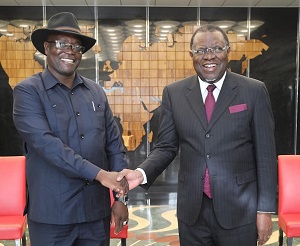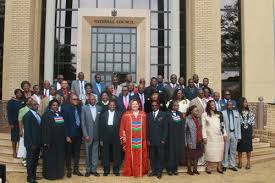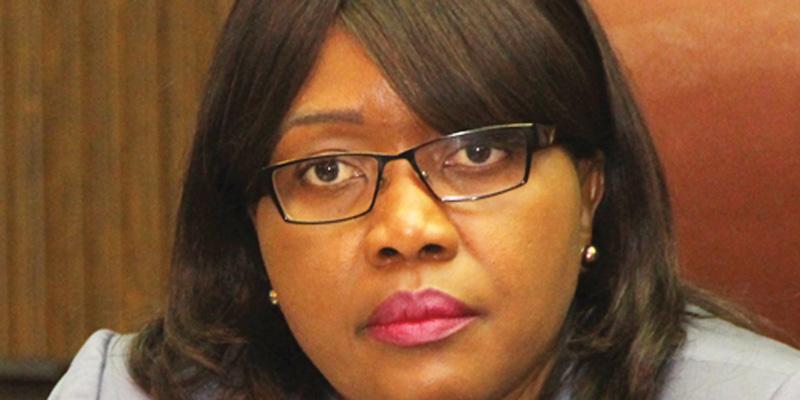
Legal Year opening brings 2016 judicial achievements into perspective

The President, H.E. Dr Hage Geingob (centre front) flanked by the Deputy Chief Justice, Hon Mr Justice Petrus Damaseb (centre left) and the Chief Justice of Namibia, Hon Mr Justice Peter Shivute (centre right) at Wednesday’s opening of the Legal Year. Next to Justice Shivute stands the Permanent Secretary in the Office of the Judiciary, Ms Rolanda van Wyk. Robed in black or red are all the judges of the higher courts.
The Legal Year opening, hosted at the Supreme Court by the now-independent Office of the Judiciary, was attended by senior legal practitioners, officers of the various courts, officials from the Ministry of Justice, representatives from legal bodies and by the esteemed judges of both the High Court and the Supreme Court.
In the main address, Justice Shivute gave a wide ranging overview of the judicial progress of the past year.
The most impressive improvement was achieved in the Magistrate Courts where the Chief Justice said more than 25,700 criminal cases were heard in the first semester only. More than 12,700 of these were finalised.
“Magistrates across the country participated in various courses, including criminal procedure and wildlife protection. Training in wildlife protection has become very important in the light of the disturbing trend of wanton poaching of our country’s endangered wildlife species” said Shivute to illustrate the need for the justice system to remain abreast of evolving crimes.
At the beginning of 2016, the Office of the Judiciary was made an independent judicial institution. In the regard Shivute said “the first order of business was to bring all constituent parts of the Office of the Judiciary under a unified command. Great strides have been made to that end but more still needs to be done, especially as far as legislative reform is concerned. Important pieces of legislation are still out of harmony with the changes brought about by the Namibian Constitution Third Amendment Act and the Judiciary Act of 2015. A notable example is the governance of the magistracy. The appointment, discipline and remuneration of the magistracy must be harmonised, not only in tandem with the Namibian Constitution Third Amendment Act, but also with the twin principles of the independence of the Judiciary and separation of powers.”
Elaborating on this important achievement, Shivute continued, “the Office of the Judiciary is now properly established in spite of the birth pangs which are to be expected in the formative stages of any new organisation. The professionalism and dedication of the permanent secretary and her top management has contributed greatly to the moulding a new Office from scratch. We now have a financial system in place, the IT operation has taken off the ground and HR systems are solidly in place.”
On the critical backlog of cases in the higher courts, Shivute said “the appointment in the last legal year of research assistants to assist judges with research for the preparation of judgments has produced the intended result. The number of reserved judgments has been significantly reduced in both the Supreme Court and the High Court. These young researchers, most of whom came fresh from Law School, have proven to be a valuable asset to the Judiciary and I am convinced that we must strengthen the programme.”
Acknowledging the contribution of all those involved in the execution of justice, the Chief Justice welcomed the various institutions engaged in the promotion of the rule of law and access to justice.
Naming the Minister of Justice, his deputy and senior officials; the Attorney-General; the Prosecutor General and her senior prosecutors; the Ombudsman; the organised legal profession; the police, and the correctional service, he said “Your presence here today symbolises our interdependence and the necessary relationship the judiciary seeks to foster with stakeholders in the justice sector.”
(Photograph by the Director of the Law Society of Namibia, Mrs Margaretha Steinmann)












































